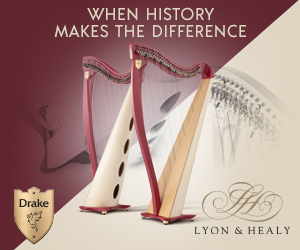Home › Forums › How To Play › Practicing duets
- This topic has 5 replies, 4 voices, and was last updated 10 years, 11 months ago by
Gretchen Cover.
-
AuthorPosts
-
April 26, 2013 at 3:06 am #60227
Gretchen Cover
ParticipantI am playing duets with a guitar player. Duet playing is new to me. I’ve done ensemble work but never really worked up pieces with just one other player. Does anyone have tips on how to practice and get pieces polished? Do you play slowly together and work up to tempo or do you practice your part and then work on the rough areas? Any suggestions on how to work efficiently with another musician would be appreciated.
April 27, 2013 at 10:16 pm #60228patricia-jaeger
MemberFirst, realize the guitar has 2 open E strings and unless the player uses a capo, that easy key of four sharps does not suit harp players so well. There must be good compromise by both partners, to play in keys where both instruments sound well together.
Also, arrange duets so the harp is not always accompanying, or vice versa. Within the composition let each instrument have a chance at the melody, as well as the harmony. As you mentioned, each works alone at first, using agreed tempi; then when coming together it will be much easier to find any rough places still remaining. If recording equipment is available, each player might record his/her own part so the other player could practice at home, along with the recorded duet part. Coming together, make sure measures are numbered . Decide where rubato would be listened for, if appropriate to the piece, and that dynamics enhance the composition. Have eye contact frequently, just as in a trio or quartet. Performing before an audience, the duet needs to sound fresh and alive so allow some give to happen ,but
still keep a tight unit, as if one instrument.April 27, 2013 at 11:12 pm #60229kreig-kitts
MemberI think ensemble time should be spent working on musical expression and ensemble elements such as balance and blend. Players should be able to play their parts fairly cleanly before coming together. The areas they work on hopefully won’t be where individuals have problems playing, but where the group isn’t playing well together or needs to agree on things musically, such as how to play an attack together.
April 28, 2013 at 12:19 am #60230Gretchen Cover
ParticipantThank you both for your excellent helpful suggestions. I had not thought about recording each part. I am fortunate to have access to recording equipment at a local church.
I figure it is a given that both players know their parts before rehearsing. I was not clear about that in my initial post for which I apologize.
April 30, 2013 at 3:34 am #60231Elizabeth Volpé Bligh
ParticipantAt the first rehearsal, bring along a pencil and mark in the places where one of you leads the other, and then practise nodding or looking up every time you get to that spot. Don’t use the person’s name, (i.e. “nod at Joe”), but rather, use the name of the instrument (“nod at guitarist”). You never know when you’ll be playing the piece again, or loaning the music to a different ensemble.
May 1, 2013 at 1:50 am #60232Gretchen Cover
ParticipantWe have a rehearsal tommorrow. I will put all these tips into our practice. Thank you so much for all ]]the advice.
-
AuthorPosts
- You must be logged in to reply to this topic.






